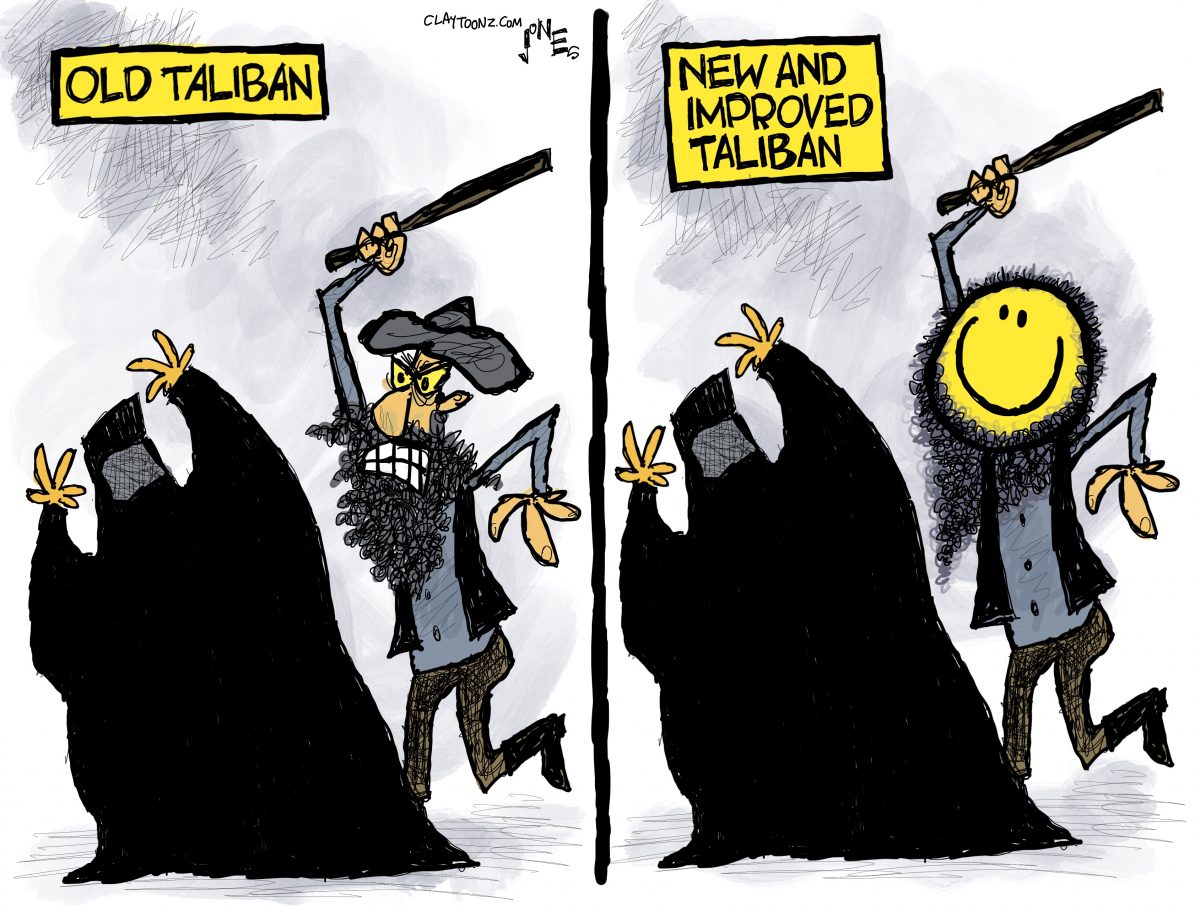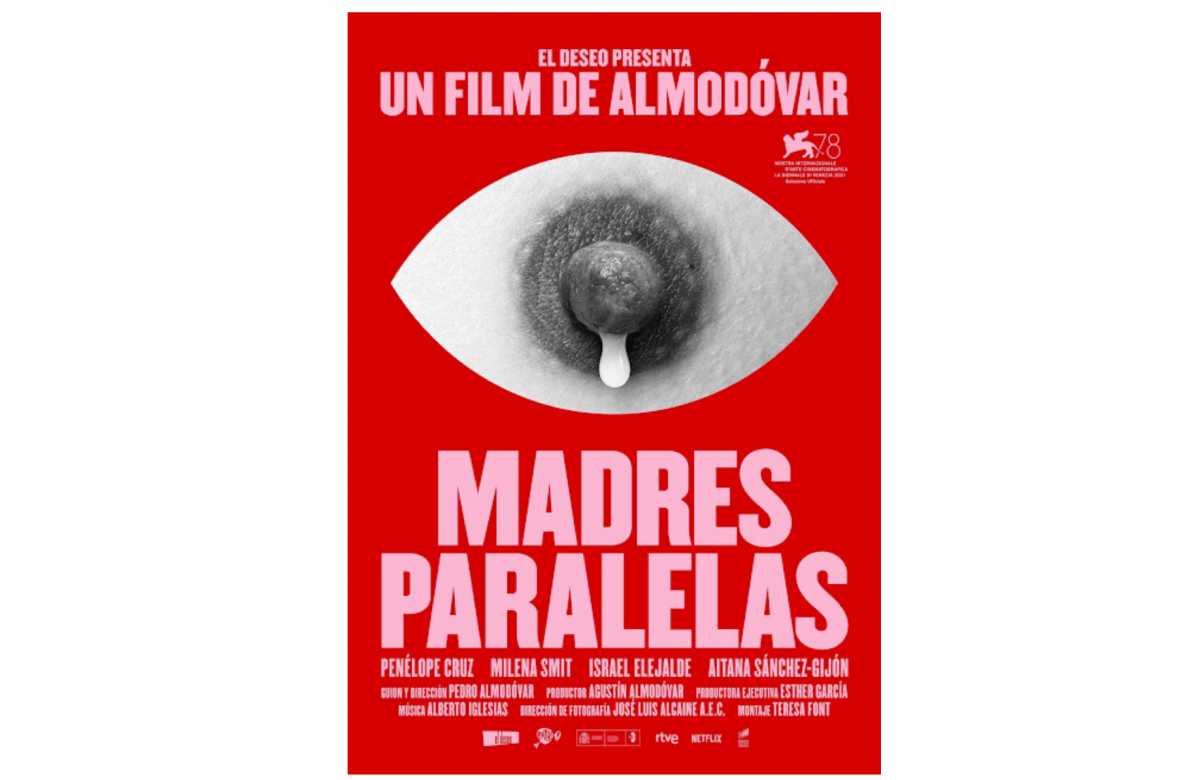This month saw two art takedowns at the behest of algorithms. Facebook removed an anti-Taliban editorial cartoon by Clay Jones, and earlier this month, Pedro Almodóvar’s latest film Madres Paralelas (Parallel Mothers) had its poster removed from Instagram. Both images were taken down for unspecified reasons, and it is likely opaque algorithms removed them.
Claytoons

In their first news conference, a Taliban spokesperson said, “We would like to assure them that there’s not going to be any discrimination against women, but of course within the frameworks that we have.” Jones’ editorial cartoon was in response to this and similar statements made by the Taliban about the treatment of women. The cartoon shows that the face may have changed, but the treatment of women won’t.
Shortly after the cartoon was posted on Facebook, it was removed; and the posting account was suspended. Jones appealed the three-day suspension and was denied without being given a reason for the ban. Not being given a reason is a good indicator of an algorithmic takedown.
Likely, Facebook doesn’t know why the image was removed due to the automation of the algorithm. It could be the depiction of violence toward women or the presence of the word Taliban, a group banned from Facebook under their Dangerous Organization policy; we just don’t know. On his Claytoonz.com YouTube channel, Jones says what is important is not that his cartoon was removed but that an anti-Taliban cartoon was.
Parallel Mothers

Instagram recently removed a movie poster for Parallel Mothers, most likely tagged by an algorithm. The poster, designed by artist Javier Jaén, features an artistic representation of an eyeball with a lactating nipple for the iris. It did not take long for public outcry in defense of the art to prompt an apology and reinstatement of the image across the platform. In their statement to the Associated Press, Instagram stated,
“We do . . . make exceptions to allow nudity in certain circumstances, which includes when there’s clear artistic context. We’ve therefore restored posts sharing the Almodóvar movie poster to Instagram, and we’re really sorry for any confusion caused.”
The Parallel Mothers example brings up the issue of art bans if they contain nudity. It is the prerogative of a private company to decide on the type of content allowed on their platform. However, this art piece should have had no issues with its policies and community guidelines. So, who is deciding if a post is art, and what criteria are they using? The algorithms are. As Almodóvar points out, algorithms lack “heart or common sense.”
Algorithmic Issues
Almodóvar is a world-famous filmmaker, and the support and public outcry he received was enough to turn the ruling in his favor. This mini victory for one high-profile artist outlines an issue that affects all artists, including comic and cartoon artists who do not have the followers and global backing to receive a reversal from a large corporation. Contacting companies to have work reinstated can be time-consuming as well as fruitless. In the case of Claytoonz, no reason was given for the suspension, and Facebook denied his appeal. Would the Claytoonz piece have been reinstated with global outcry? It is hard to tell, especially with no transparency.
Social media platforms have become a large marketplace. As an artist, they are tools used to find a following. Having work removed or an account suspended from a platform can be frustrating and cause a loss of potential income. Several online communities have formed filled with works that have faced takedowns from algorithms.
Relying on algorithms for content moderation is far from perfect. Algorithms often lack an eye for nuance and intent, as well as deciphering photography from photo-realistic images. The process by which algorithms sift their input is not always transparent to the company employing them. If no one can answer why an item is removed, that is a big problem and an issue of out-of-control automation.
These situations require a measured human touch. Currently, human oversight is easier to attain if you are in a place of power and have the followers to demand a change. National Coalition Against Censorship puts it well, the “exceptions to allow nudity in certain circumstances” needs to apply to all artists, no matter their level of fame.
Algorithms are a tool of modern censorship to be aware of. Obeying the community guidelines is not always enough to save your art from a takedown, and for many artists, this can lead to a loss in revenue. We will continue to stay alert to these issues with algorithms. Looking into the future, we will continue to examine how the algorithm affects the comics community and what actions we can take.
“They say their technology can’t differentiate the context. I don’t care. Change your technology then.”
artist Javier Jaén